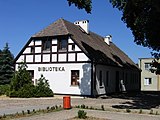Recz
History
| Year | Pop. | ±% |
|---|---|---|
| 1871 | 3,035 | — |
| 1880 | 3,312 | +9.1% |
| 1890 | 3,166 | −4.4% |
| 1900 | 3,033 | −4.2% |
| 1910 | 2,939 | −3.1% |
| 1925 | 2,968 | +1.0% |
| 1950 | 1,210 | −59.2% |
| 1960 | 1,931 | +59.6% |
| 2010 | 2,963 | +53.4% |
| Source: | ||
The settlement dates back to the Early Middle Ages, and in the 10th century it became part of the emerging Polish state under its first historic ruler Mieszko I. Recz was first mentioned in 1269. In the late 13th century a Cistercian nunnery was founded. In 1373 Recz became part of the Lands of the Bohemian Crown (or Czech Lands), ruled by the Luxembourg dynasty. In 1402, the Luxembourgs reached an agreement with Poland in Kraków. Poland was to buy and re-incorporate Recz and its surroundings, but eventually the Luxembourgs sold the town to the Teutonic Order, whose rule lasted until 1454.
During the Polish-Swedish War, in 1657 the town was captured by Poles. From the 18th century it was part of the Kingdom of Prussia and subsequently in 1871 it became part of Germany. After the defeat of Nazi Germany in 1945, it became part of Poland. The German populace was discriminated and expelled.
Transport
Recz is located on the intersection of the national road 10 and voivodeship road 151. There is also a railway station in the town.
Gallery
-
Library
-
Defensive walls
-
Elementary school
Notable residents
- Daniel Cramer (Daniel Candidus) (1568–1637), German Lutheran theologian
- Franz Eisenach (1918–1998), Luftwaffe fighter ace
- Marie Schlei (1919–1983), German politician
References
- ^ Stan i struktura ludności oraz ruch naturalny w przekroju terytorialnym w 2010 r. (PDF) (in Polish). Warszawa: Główny Urząd Statystyczny. 2011. p. 108. Archived from the original (PDF) on 13 November 2011.
- ^ Ortsnamenverzeichnis der Ortschaften jenseits von Oder und Neiße by M. Kaemmerer
- ^ Dokumentacja Geograficzna (in Polish). Vol. 3/4. Warszawa: Instytut Geografii Polskiej Akademii Nauk. 1967. p. 42.
- ^ Rogalski, Leon (1846). Dzieje Krzyżaków oraz ich stosunki z Polską, Litwą i Prussami, poprzedzone rysem dziejów wojen krzyżowych. Tom II (in Polish). Warszawa. pp. 59–60.



